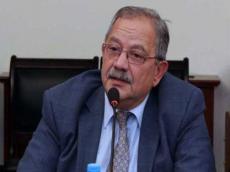|
|
TODAY.AZ / Politics
Azerbaijan's victory upsets political analyst Michael Rubin
08 December 2020 [12:34] - TODAY.AZ

By Elkhan Alasgarov
The start of the peace process in Nagorno-Karabakh and the
restoration of Azerbaijan’s territorial integrity have worried some political
observers, who are haunted by the resolution of the conflict within the
framework of the agreement between Azerbaijan, Russia and Armenia.
Among such political observers is Michael Rubin, a
researcher at the American Enterprise Institute, who has published an article
in The National Interest under the intriguing title: "Is this the end of
Azerbaijan?" Reading an article by Mr. Rubin, who is known to Azerbaijani
experts for his absurd initiative to dispatch American diplomats to Khankendi
in order to create a US consulate in this city, cannot be called a pleasant
process. Therefore, there is no point to talk about the mistakes he makes in
his historical assessment of the origins of the Karabakh conflict.
However, it is impossible to ignore his comments that
"Azerbaijanis can celebrate November 10 as the date of their victory over
Armenia in the war in Nagorno-Karabakh in 2020, but when the celebration recede
is over, they may simply understand that this marks the beginning of the end of
Azerbaijan's real independence." Asserting in The National Interest that
the stationing of the peacekeeping contingent of Russian troops in Karabakh may
lead to the loss of Azerbaijan's independence, the author not only
misunderstands the expediency of the peacekeeping process, but also
underestimates Baku’s influence in the regional developments.
It is interesting how the stationing of a 2,000-strong
Russian peacekeeping contingent into the region, 400 km from the capital Baku,
can lead to the "loss of independence" for Azerbaijan. If it were so
simple, then it would be better for Mr. Rubin to speak about the loss of
independence of Armenia, in whose capital, the number of US embassy employees
exceeds those of Russian peacekeepers - over 2500 people.
He claims that Russian peacekeepers’ role is not merely
confined to ensuring the ceasefire regime between Azerbaijan and Armenia. Rubin
alleges that the Russian troops’ return to the region has been Putin’s
longstanding goal as step-by-step he appears to return all former Soviet states
to his fold. Rubin's view of Turkey’s role is similar.
The author writes: " Azerbaijan's war aim was
Nagorno-Karabakh and the adjacent Azerbaijani regions, which Armenia captured
during the 1988-1994 war. But Turkey's motivation was different. Erdogan and
the military intellectuals ... have long embarced pan-Turkic ambitions to link
Turkey culturally, economically and politically with Azerbaijan and the Turkic
states of Central Asia ...". The question is - what's wrong with Ankara's
desire to establish cultural, economic and political ties with the countries of
Central Asia? And why does Mr. Rubin present the normal state aspiration of
Turkey as pan-Turkic ambitions?
If you take a close look at Mr. Rubin’s article, you will see interesting points related to the fact that he is inclined not only to pathological Islamophobia, but also to anti-Russian and anti-Turkish assessments of the situation. In the Turkish media, Rubin is a well-known figure. He was repeatedly accused of trying, together with George Soros, to organize riots in various cities of Turkey.
Obviously, in case of Karabakh, the settlement process in conditions when Russia and Turkey were able to reach mutual understanding, caused a wave of jealousy among political scientists, including Mr. Michael Rubin with his latest opus on the pages of The National Interest. Let's answer Mr. Rubin's question - the peace process in Karabakh and the restoration of territorial integrity is not the end of Azerbaijan, but a military-political victory for Baku, which opens the way to prosperity for the entire South Caucasus region.
URL: http://www.today.az/news/politics/201287.html
 Print version
Print version
Connect with us. Get latest news and updates.
See Also
- 08 December 2025 [10:57]
Important project for Baku receive approval of EU: East-West energy chain close - 05 December 2025 [14:36]
OTS Chief stresses safe working conditions and cooperation for sustainable growth - 05 December 2025 [14:10]
President Ilham Aliyev congratulates King of Thailand - 05 December 2025 [12:12]
Pashinyan showed the wrong side of the Karabakh negotiations: there is no sensation for us, it is a shock for the Armenians - 05 December 2025 [11:51]
President Ilham Aliyev addresses participants of III international conference in Baku - 05 December 2025 [11:38]
Restoration and protection of Azerbaijani cultural heritage in Armenia is legitimate demand of Azerbaijani people: President - 05 December 2025 [11:11]
European Union is once again promising Armenia what it cannot fulfill - 05 December 2025 [11:02]
Baku hosts Azerbaijan–Georgia Media Forum on public trust and information security - 04 December 2025 [12:14]
President Ilham Aliyev receives UK’s Minister of State for Defence - 04 December 2025 [10:10]
Separatist "underground" in Armenia and prospects for peace
Most Popular
 Pashinyan showed the wrong side of the Karabakh negotiations: there is no sensation for us, it is a shock for the Armenians
Pashinyan showed the wrong side of the Karabakh negotiations: there is no sensation for us, it is a shock for the Armenians
 OTS Chief stresses safe working conditions and cooperation for sustainable growth
OTS Chief stresses safe working conditions and cooperation for sustainable growth
 China launches longest nonstop flight
China launches longest nonstop flight
 Southern Gas Corridor to channel most earnings to SOCAR and Azerbaijani state - Fitch says
Southern Gas Corridor to channel most earnings to SOCAR and Azerbaijani state - Fitch says
 Construction progresses on Nakhchivan railway segment bordering Armenia
Construction progresses on Nakhchivan railway segment bordering Armenia
 Garabagh horses, national music and dance totally captivate audience
Garabagh horses, national music and dance totally captivate audience
 President Ilham Aliyev congratulates King of Thailand
President Ilham Aliyev congratulates King of Thailand
